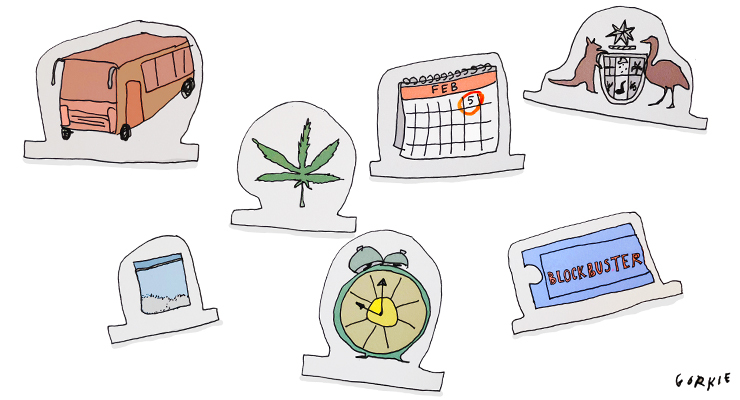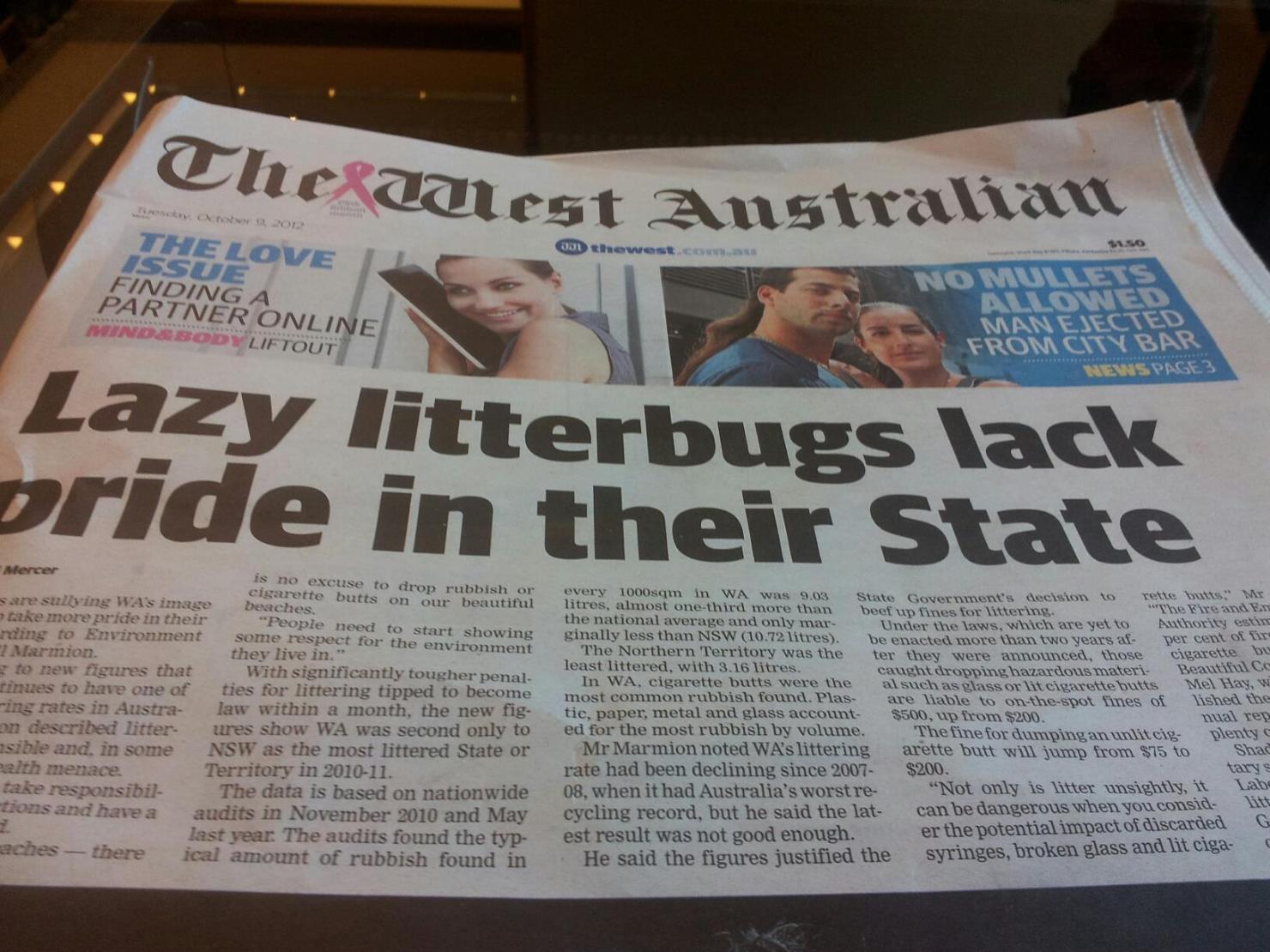
The preamble to Australia’s constitution makes no mention of Western Australia. It was so reluctant to federate that it neither sought popular support for the draft constitution, as other colonies had, nor joined the petition to Queen Victoria to enact it. By the time the state voted in favour of federation — thanks to financial concessions from the other colonies and an influx of voters from the east working in the goldfields — it was too late to amend it.
The State Library describes the WA colonists fixing their gaze “across the Indian Ocean towards their homeland rather than towards the Australian interior. The western colony was much more British in its outlook than eastern Australia with its larger populations of second and third-generation Australians.”
Within five years the Western Australian Legislative Assembly passed a resolution that federation had “proved detrimental to the interest” of the state and called for a referendum to canvass public support to withdraw from the Commonwealth. It went nowhere.
***
In 1933, the state held an official referendum on whether to secede. A landslide voted in favour. The constitution has no provisions for states to secede, and a joint select committee ultimately found that WA could not leave without the federal government’s consent.
In 2009 Western Australia held its fourth referendum on whether to adopt daylight saving. Like the previous three times, and a 2005 referendum on whether shops should be allowed to trade on a Sunday, most voters could not be convinced the upheaval would be worth it, and voted no.
***
On October 9, 2012, The West Australian, the state’s only daily paper, ran the following front page:

2012 was the year when shops were allowed to open on Sundays.
***
Perth is closer to Jakarta than it is to Sydney. In 2019, when tourism minister Paul Papalia argued against the characterisation of Perth as the most isolated city in the world, he did not look to the rest of Australia to make his point: “Yes, we are far away for our east coast neighbours, but we need to look towards our own backyard … Africa, the Middle East, the subcontinent and Asia are our close neighbours.”
***
Returning in 2017 for the first time since I’d moved, I’m struck with a shock of recognition as I pass something I must have seen hundreds of times, but suddenly lands like it’s the Acropolis: Blockbuster Video in Morley. Perth had the last Blockbuster in the country, probably the second last in the whole world. It didn’t close until 2019. I’ll never forgive myself for not going in.
***
On a special Q&A shot in WA in 2010, a friend asked then-premier Colin Barnett: “You stated last week that you felt WA was under siege from the federal government. As the only Liberal state, why should WA not secede once and for all?”
Barnett said he did not favour secession, but if Australia became a republic and dissolved the constitution, it was “a distinct possibility” that WA would not return.
***
Western Australia has one newspaper. In 2016 The West takes over its only print competitor, The Sunday Times. In 2019 it buys out News Corp’s stake in the Community News Group, putting almost every print publication in Western Australia under the control of Kerry Stokes, who also owns Channel Seven.
***
December 2021: I’m discussing the likelihood of Premier Mark McGowan sticking to his plan of opening up on February 5 with someone in WA Labor. They tell me “everyone outside of WA is sick of McGowan’s borders, but his decision to open up polls overwhelmingly poorly for him”.
***
In 2009, the Barnett government introduces harsh laws targeting marijuana possession. Part of this is to give police unprecedented powers to stop and search people. Arguing in favour, a backbencher tells Parliament about Hitler’s rise to power because he “provided security during a time of anarchy”. The backbencher is Peter Abetz, and the statement comes a year after his brother Eric had revealed their great uncle was a senior figure in the Nazi party.
***
Perth scatters in all directions like dropped Lego. Suburbs stretch for 150 kilometres up and down the coast, and for another 50 inland. The population of 2 million is spread over a space bigger than Shanghai. It is near impossible to prise a Melbournite from their home suburb. A 30-minute trip in Perth, to work or to visit friends, is just what people do.
Fremantle is the exception to almost every Perth rule; it’s tightly knitted, has kept almost all its heritage buildings, and people who live there can usually see no reason you wouldn’t want to come to them.
***
The Barnett government coincides with WA’s most recent resources boom. Over this period Western Australia’s state debt balloons from $3.6 billion to $40 billion. Perth becomes known as the meth capital of Australia. The influx of money creates a two-tiered economy. Fly in-fly out work hollows out communities, leading to family breakdowns and a rash of suicides.
***
Every single response I see from WA-based Facebook friends praises McGowan’s decision to indefinitely delay the opening of the border. Every single one — from the father of two from Esperance who had never voted Labor before 2021 to the avowed socialist who occasionally writes for Red Flag.
***
It’s almost impossible to communicate how shatteringly beautiful the beaches edging the western half of the city are. One day, driving down the West Coast Highway with my parents, my mother glances at the undulations of white gold sand tufted with ragged grass swooping down into the sea, ablaze beneath the sun. “Most people have to go on holiday to see stuff like this,” she says.
***
In 2010, I was at the West Australian Screen Awards, where a short film I had made was up for an award. The movie that deservedly beat us was was called This is Perth, a surreal, affectionate mock-tourism video that had become a viral hit. As a chipper announcer describes Perth as the “greatest city in the world, where millions flock every day, a heady mix of old and new …” there’s a montage of oddly beautiful shots of buses driving through empty city streets, and the kind of mud-coloured office blocks straight out of Tinker Tailor Soldier Spy that Perth erected after levelling most of its original buildings in the 1980s.
The complimentary drinks and the intervening decade makes me doubt the following memory, but this is what I recall: someone asked the makers how they’d got these 28 Days Later-style shots of Perth as a ghost town. Was it shot on a public holiday? An early morning? They said it was a Tuesday afternoon.








You can’t have it both ways. You patronise us as if we’re ridiculous and hardly a legitimate party to the national conversation and then complain because we don’t want to be a member of the club.
Thanks Charlie!! Your article prompted me to take a bit of a ‘trip down memory lane’.
I went over to Perth in July 1968 with my then girlfriend and we fell in love with the place. Although the relationship didn’t last, my love for Perth will endure as long as I am around.
I boarded in a block of flats right next to the Rose Gardens in Nedlands and worked in a bank on the corner of St Georges Terrace and Barack Street in Perth for about 4 months. The city was absolutely beautiful and clean. Then I spent about 8 months down at a branch in High Street Fremantle just down from the Roundhouse. I distinctly remember the day in July 1969 that I put up my “Next Teller Please” sign so that I could slip out and go down to the Vox Adeon store and watch the moon landing on the black and white television set they had set up in the window.
The beaches were absolutely magnificent (and so were the girls!) It had everything, and more, that a 20-21 year old young bloke could ever want. I visited Perth on both of my honeymoons and the place was a hit with both of my wives.
I returned to OZ via the CTC Russian cruise line to Fremantle in 1975 after a decade’s absence and it seemed like the very frontier.
The last couple of hundred miles to the SA border was a scraped red dirt & gravel washboard brain rattler – good times.
Yes, Epimenides I traveled across the Eyre Highway a couple of times in 1968 when there was still about 300 miles or so of corrugations and the so-called ‘bull-dust’. It was a bone-shaking experience. Do you remember Ivy Tanks? God knows what became of that place when the sealed road by-passed it? Great memories!!
The final paragraph could be a rework of Ava Gardner’s apocryphal quip after making On the Beach in 1959 – “For a movie about the end of the world Melbourne is perfect“.
Tuesday afternoon in WINTER though! 😉
And even then, it would be too hot. They’re staring at another 42C today. By mid century, with 4m people, barely survivable summers, and not enough water, they’ll have climate refugees, and they’ll be blaming everyone else.
We’re a weird mob aren’t we? Gotta love those beaches though!
Not that I am any expert but from what I have seen, W.A. has the best beaches in the world! (Not only that, they also have a world-class policy for dealing with COVID too!)